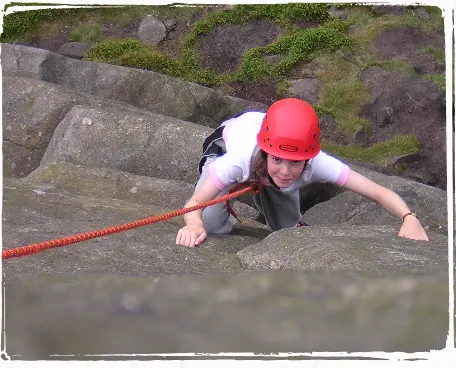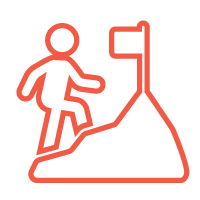reach for the top
Rock climbing is the perfect way to overcome fears and achieve unbelievable heights, whether it’s facing a climb for the very first time or summiting the most challenging cliffs.
Students will discover it takes determination, trust, and the help of others to get to the top – building confidence and gaining an enormous sense of achievement.
We climb crags in the Yorkshire Dales and North York Moors National Parks, and the level of difficulty of the climb is chosen to suit the age and level of experience of students on adventure.
What’s Included

All specialist equipment
All climbing equipment and climbing helmet.
All specialist clothing
Rock climbing shoes.
Transport
Once at the centre, all transport to and from adventure activities is provided.
Experienced, full-time, outdoor teachers and tutors
Each group of 12 students is led by a fully qualified and experienced outdoor tutor.
– back in the classroom –
curriculum links
With all the mental, physical, and social benefits of climbing, it’s no surprise that rock climbing can also benefit students’ performance at school. Rock climbing requires focus, problem solving and teamwork, and provides the opportunity to link to the following areas within the curriculum:
Key Stage 2
Science
At the crag students will learn about the type of rocks they are climbing on. They will compare this to other rocks and learn how they were formed, what they are made of, and the time scales involved.
Geography
The group will learn to describe and understand key aspects of mountains – how they are formed and how time has shaped them, and what key features can be identified.
Key Stage 3
Geography
Students will learn about the formation of the environment – how valleys, hills, moorlands, and coast are shaped, and how this is sped up by human impact or environmental changes.
Science
The group will study the key features of rocks they are climbing on. They will learn how to recognise whether they are igneous, sedimentary, or metamorphic rocks and understand the process of this formation.
Key Stage 4
P.E.
Following the GCSE P.E curriculum, we can develop student’s skills to help them perform key climbing skills and techniques on increasingly demanding and progressive grades of climbs, in interesting and fun environments.
Geography: Glaciation
As part of a climbing session, students can learn all about the formation of the landscapes around them and the part glaciers had to play. They can also learn all about what these landscapes now offer, their uses, and how use conflicts can be managed.
LOCATIONS: Offered at both Bewerley Park and East Barnby
YEAR GROUPS: Suitable for Primary School, Secondary School, and post 16 students

DURATION: Available as a full or half day activity

DIFFICULTY: Adapted to the age and level of experience of students on adventure
MIN GROUP SIZE: 12 Students
reach for the top
Rock climbing is the perfect way to overcome fears and achieve unbelievable heights, whether it’s facing a climb for the very first time or summiting the most challenging cliffs.
Students will discover it takes determination, trust, and the help of others to get to the top – building confidence and gaining an enormous sense of achievement.
We climb crags in the Yorkshire Dales and North York Moors National Parks, and the level of difficulty of the climb is chosen to suit the age and level of experience of students on adventure.
What’s Included?
All specialist equipment
All sporting equipment and adventure specific helmets and harnesses.
All specialist clothing
Rock climbing shoes and waterproofs when required.
Transport
Once at the centre, all transport to and from adventure activities is provided.
Experienced, full-time, outdoor teachers and tutors
Each group of 12 students is led by a fully qualified and experienced outdoor tutor.
classroom benefits
curriculum links
With all the mental, physical, and social benefits of climbing, it’s no surprise that rock climbing can also benefit students’ performance at school. Rock climbing requires focus, problem solving and teamwork, and provides the opportunity to link to the following areas within the curriculum:
Key Stage 2
Science
At the crag students will learn the about the type of rocks they are climbing on. They will compare this to other rocks and learn how they were formed, what they are made of, and the time scales involved.
Geography
The group will learn to describe and understand key aspects of mountains – how they are formed and how time has shaped them, and what key features can be identified.
Key Stage 3
Geography
Students will learn about the formation of the environment – how valleys, hills, moorlands, and coast are shaped, and how this is sped up by human impact or environmental changes.
Science
The group will study the key features of rocks they are climbing on. They will learn how to recognise whether they are igneous, sedimentary, or metamorphic rocks and understand the process of this formation.
Key Stage 4
P.E.
Following the GCSE P.E curriculum, we can develop student’s skills to help them perform key climbing skills and techniques on increasingly demanding and progressive grades of climbs, in interesting and fun environments.
Geography: Glaciation
As part of a climbing session, students can learn all about the formation of the landscapes around them and the part glaciers had to play. They can also learn all about what these landscapes now offer, their uses, and how use conflicts can be managed.